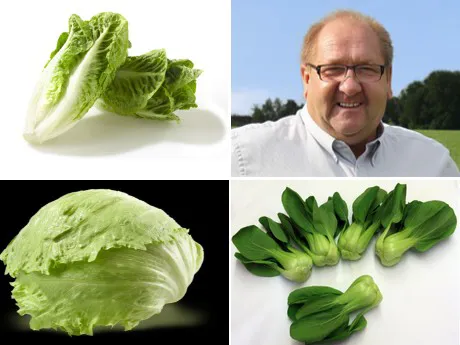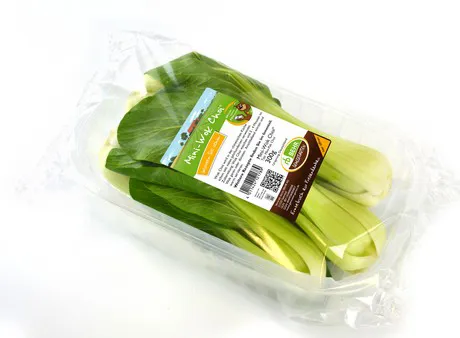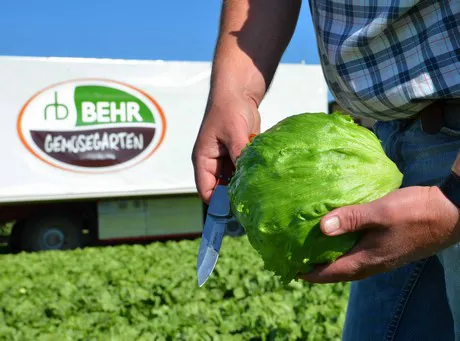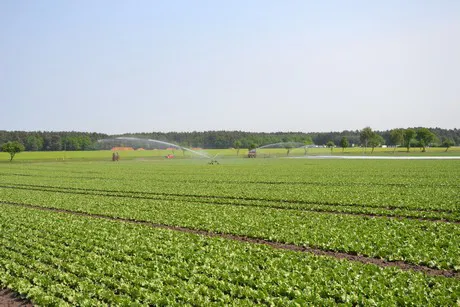Managing Director Rudolf Behr gladly talks about the product that brought his company to the top. In the 70s, the German gastronomy was supplemented by American steakhouses with their salad counters and thus the demand for iceberg lettuce grew, mainly because this variety is much longer lasting than lettuce. Iceberg lettuce was then imported from the US for about 80 D-Marks per 25 heads. "At the time, people said that we could not grow the American varieties. Many tried, but the iceberg lettuce could not be harvested at the same time as the Bataviaköpfe. Iceberg lettuce has a longer development time. We left the lettuce for another 14 days. The result was amazing: beautiful lettuce heads.”

CEO Rudolf Behr (top right) and his most successful products: the mini-Romana (top left), iceberg lettuce (bottom left) and mini-Pak Choi (bottom right)
The rise
In the beginning, the Behr company was a modest vegetable farm of 12 hectares with a mixed acreage of apples, vegetables and 6000 m2 under glass. When Rudolf Behr took over the family business in 1983 from his father, fruit cultivation was over and the company was completely focused on the cultivation of outdoor vegetables. After a failed attempt in the 80s, in the early 2000s he could celebrate a great success with the introduction of the mini-Romana. “In Spain at that time you had the Little Gem, which was smaller than today's mini-Romana. But this new caliber sold well in Germany right away.”
In the first year, BEHR AG cultivated 1.5 million pieces and half were destroyed. In the second year 3 million were in cultivation and again half were thrown away. "In the third year we stayed at 3 million and had to replant in the middle of the summer so we could sell 4.5 million. In the two years after that, we had 10 and 80 million in cultivation. That was a real explosion." According to the experienced vegetable specialist, this success has to do with portioning. “The 2 to 3 pieces a pack corresponded with wishes of smaller households. Iceberg lettuce always has the problem that you only need half and the rest is left in the fridge.”
Free range iceberg lettuce has been part of Behr AG's standard offer for many years
Weather conditions
The success of BEHR AG is also closely linked to the optimal climate south of Hamburg, as Behr will emphasize. This region has very little rain, completely different to the situation in the east, west and north. Here we have a maritime climate: that means it is nice and windy, relatively dry and not too warm. The regional differences are quite big. “The weather conditions are often unfavorable at many locations, which is why in the outdoor area, the weather is always a hot topic. "Growing vegetables, you live off the weather. We always overproduce, and if production would be optimal everywhere, that would be disastrous."

In addition to its vast acreage in northern Germany (Lower Saxony and Mecklenburg-Vorpommern) and the farm south of Frankfurt,. Behr also has about 800 hectares of open field vegetables in Spain. Because of this, he is able to offer many products all year round; apart from the varieties already mentioned he also sells colorful salads, kohlrabi and mini-Pak-Choi. This last variety is also an indication of the steady trend towards mini vegetables.
“For five years we have had mini-Pak-Choi on offer. This variety is very popular for Asian cuisine, because it is varied and decorative. The big Pak-Choi, on the other hand, was a catastrophe when it was introduced." Retailers are similarly unenthusiastic about Chinese cabbages. “It is still a small culture. With sales of 1.2 million iceberg lettuces a week, about 100,000 heads of Chinese cabbage will be marketed. That is more or less the current situation.”

Opportunities
The opportunities in Northern Germany and its stable clientele of supermarket chains and catering distributors make Behr AG a thriving, sustainable company. In addition to this, the company has about 500 permanent employees and over 2000 seasonal workers. Nonetheless, the owner also sees new opportunities in the product range. “We currently have 45 cultures. We also grow organic produce on some 200 hectares. That's only 7 percent, but it's being expanded continuously. When a culture is big enough and mechanisation is an option, we go for it. For individual articles, there is hardly any space left in the organic sector, but the organic sector is growing with the influx of new articles.”
For more information:
BEHR AG - Gemüsebau
Vorstandsvorsitzender: Rudolf Behr
Ohlendorfer Str. 83, 21220 Seevetal - Ohlendorf
+49 (0) 04185 79 33 0
Vorstand@behr-ag.com
www.behr-ag.com

